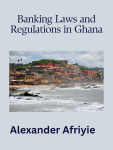Introduction
This book provides an in-depth look at the banking laws and regulations in Ghana. It explains the legal framework that governs banking operations, credit activities, payment systems, as well as financial consumer protection. It examines how the rules affect competition among banks, access to financial services for all segments of the population, and macroeconomic stability. Topics discussed include prudential supervision and regulation of banks, capital adequacy requirements for commercial banks, acquisition of distressed banks by strategic investors, anti-money laundering initiatives, consumer credit regulation and supervision, mobile banking law and electronic payment systems. It provides a comprehensive overview of all relevant legislation from 2010 to date while offering fresh insights into developments in the sector since then. This book is essential reading for lawyers who wish to gain insight into Ghana’s regulatory environment with respect to banking laws and regulations.
Objectives
- Provide an overview of the banking laws and regulations applicable to the banking sector in Ghana.
- Explain the key legal provisions governing Ghana’s banking sector and their implications on business activities.
- Identify best practices for compliance with regulatory requirements pertaining to the banking sector.
- Analyse emerging trends in banking regulation and their potential impacts on financial stability in Ghana.
- Discuss approaches to help banks meet regulatory obligations in a cost-efficient manner.
- Outline strategies for dispute resolution between banks and customers over matters related to banking issues.
Table of Contents
Chapter One: Introduction to Banking Laws and Regulations in Ghana
– History of Banking in Ghana
– Overview of the Banking Sector in Ghana
– Overview of Banking Laws and Regulations in Ghana
– Ghana’s regulatory environment with respect to banking laws and regulations.
-Overview of legal infrastructure
-Common loan documentation
-Relevant legislation
-Corporate governance
-Regulatory Framework and Supervision
– Current Regulatory Framework
-Current Legislation Related to Banking Regulation
– Regulatory Authorities & Structures
– Applicable Policies & Guidelines
– The Role of International Standards & Codes
-Bank Licensing and Registration Requirements
Chapter Two: Banking Regulations
-Provide an overview of the banking laws and regulations applicable to the banking sector in Ghana.
-Key legal provisions governing Ghana’s banking sector and their implications on business activities.
-Best practices for compliance with regulatory requirements pertaining to the banking sector.
-Emerging trends in banking regulation and their potential impacts on financial stability in Ghana.
-Approaches to help banks meet regulatory obligations in a cost-efficient manner.
-Strategies for dispute resolution between banks and customers over matters related to banking issues.
Chapter Three: Bank Supervision and Regulation
– Types of Banks and Financial Institutions in Ghana
– Prudential Regulations for Banks and Financial Institutions
– Central Bank of Ghana Powers and Responsibilities
– Licensing Requirements for Banks and Financial Institutions
– Enforcement Mechanisms for Non-Compliance
– Reporting, Examining, Auditing, & Investigating Power of the Central Bank of Ghana
-How the rules affect competition among banks
– How the rules affect Access to financial services for all segments of the population
– How the rules affect Macroeconomic stability
-Consumer credit regulation and supervision
-Mobile banking law and electronic payment systems
Chapter Four: Legal framework that governs banking operations.
– Legal Foundations for Bank Liability
-Legal framework that governs banking operations on Credit activities, Payment systems and financial consumer protection
-Overview of Regulatory Authority Relevant to Banking Operations in Ghana
– Understanding Core Banking Laws and Regulations in Ghana
– Financial Services Act, 2019 and its Implications on Banking Operations in Ghana
– Laws Relating to Capital Markets and Their Impact on Banks in Ghana
– Regulations Governing Credit Risk Management of Banks
– Central Bank’s Role and Powers Relating to Banks Operating in Ghana
– Review of Consumer Protection Roles for Banks Operating in Ghana
– Principles Guiding Financial Reporting Standards for Banks in Ghana
Chapter Five: Bank Management & Supervision
-Review functions of bank management
-Internal policies/procedures governing borrowing/lending decisions
-understand roles/responsibilities among various levels of supervision.
-Proper implementation/execution of risk management processes across entire organization.
Chapter Six: Deposit Insurance and Consumer Protection
– Overview of Deposit Insurance Program in Ghana
– Rules Pertaining to Interest Rates on Deposits
-Protecting Customers from Fraud & Misrepresentation
-Financial Consumer Protection Law in Ghana
-An Overview of Current Consumer Protection Legislation
-Consumer Rights Explained
Chapter Seven: Capital Adequacy Regulations & Liquidity Risk Management
– Applicable Laws Governing Capital Adequacy Requirements
– Liquidity Risk Management Guidelines
-Bank Capital Requirements
-Liquidity Ratio Requirements
-Concentration Risk Limits & Risk Management Principles
– Capital adequacy requirements for commercial banks
-Acquisition of distressed banks by strategic investors
Chapter Eight: Basel Accords Implementation Status
-Basel I Compliance Status
-Basel II Compliance Status
-Basel III Compliance Status
Chapter Nine: Credit Risk Management
-Credit Exposure Limits
-Risk Mitigation Techniques
– Loan Pricing & Provision Standards
– Loan Review Procedures
– Revolving Credit Facility Management
– Secured Transactions Law Reforms
– Foreclosure Law Reforms
– Repossessions Procedure
Chapter Ten: Bank Rules and Regulations
– Credit Policies, Loan Classification & Provisioning
– Accounting Standards for Banks
– Disclosure Requirements
– Corporate Governance Guidelines
– Cross-Border Banking Activities
– Consumer -Protection Regulations
Chapter Eleven: Corporate Governance & Compliance
-Investigate areas such as board structure/structure designations
-Principles regarding customer privacy/confidentiality rights
-Internal audit policies designed to detect fraud or enforce business standards among top officials/directors
-Approaches used for debt restructuring or liquidation proceedings involving third parties or company itself.
Chapter Twelve: Asset Quality Assessments
– Scope & Nature of Assessments for Loans & Investments – Scope & Nature of Assessments for Off-Balance Sheet Instruments
– Verification Methods & Documentation Requirements – Ratings Criteria and Calibration
-Stress Testing Methodologies
– Reporting Formats
– Internal Summary Reports
Chapter Thirteen: Market Risk Management
– Uniform Securities Laws in Ghana
– Derivative Instruments Governance Framework
– Valuation Principles for Derivatives
Chapter Fourteen: Anti Money Laundering (AML) And Counter Terrorism Financing (CTF) regulations
– Overview of AML/CTF regulations
-Law on Anti Money Laundering (AML)
-Anti-money laundering initiatives
– Types of Financial Institutions Covered by AML/CTF Regulations in Ghana
– Objectives of Anti-Money Laundering (AML) and Counter Terrorism Financing (CTF) Regulations
– Identifying Suspicious Transactions & Account Activity
– Sources of Information for Detecting Suspicious Activity
– Red Flags to look out for in suspicious activity reports
– Reporting Suspicious Activity to the Financial Intelligence Centre (FIC)
– Legal Obligations of Financial Institutions & Designated Non-Financial Businesses & Professions Under the Money Laundering Act 2006(Act 749)
– How to Report Suspicion Activity & When to Report It
-Understanding Customer Due Diligence Procedures and Record Keeping Requirements for Compliance with the Money Laundering Act 2006 (Act 749).
– What is Customer Due Diligence?
-Customer Identification Requirements Under the Money Laundering Act 2006(Act 749).
-Risk Based Approach to Anti Money Laundering and Compliance with The Money laundering Act 2006 (Act 749).
-What is Risk Based Approach?
-Steps Involved in Implementing a Risk Based Approach for Anti-Money laundering
Chapter Fifteen: International Exchange Control Regulations in Force
– Overview of Exchange Controls Regulations
– Introduction to Exchange Control Regulations in Ghana
-Overview of the international exchange control regime in Ghana.
-Discussion on the underlying principles and objectives
-Examination of international treaties relevant to exchange control regulations.
-Introduction to the fundamental concepts applicable across all jurisdictions.
-Exchange Control Rules and Guidelines for Foreign Exchange Transactions in Ghana
-Analysis of foreign currency purchase and sale operations
-Exploration of restrictions on payments, transfers, and remittances from abroad
-Explanation of permitted transactions under the Central Bank’s rules.
-Study of documentation requirements applicable to exchanging currency with foreign customers.
Capital Controls – The Regulatory Environment for Investment Transactions
-Review of capital controls framework established by law
-Focus on regulations governing transferable securities, loan facilities, debt instruments & capital markets transactions.
-In-depth analysis into types of capital inflows and outflows allowed into/out of Ghana under current regulations.
-Applying International Exchange Control Regulations
Chapter Sixteen: Case Studies Related to Banking Laws & Regulations in Ghana
-Examples Include Offshore Transactions, Collateralized Loan Obligations, Money Laundering Prevention Strategies, etc
-Application of Relevant Legal Principles to Case Studies




Reviews
There are no reviews yet.